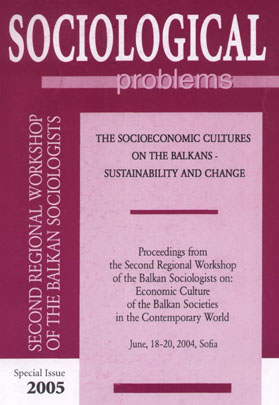Why are Small Enterprises in Bulgaria not Growing?
Why are Small Enterprises in Bulgaria not Growing?
Author(s): Vassil Kirov, Svetla StoevaSubject(s): Social Sciences
Published by: Институт по философия и социология при БАН
Summary/Abstract: This article contributes to the socio-economical debate for SME development in transitional societies by putting forward arguments about management skills, cultural patterns, management of human resources, and professional and personal trajectories of employees. The enlargement of the debate about socio-economic barriers to include “socio-cultural barriers” is aimed towards a better understanding of the SME sector and the discussion about public policies geared towards SME development, formulation, and implementation. Through qualitative research of SMEs in 3 sectors (prepared in the framework of the European comparative research project SMALL—Information and Communicational Technology, Retail Commerce and Hotels, and Restaurants and Catering), this paper presents arguments that the potential for growth of small and micro-enterprises is crucial for the sustainable development of the Bulgarian economy. However, the article assumes that micro-enterprises and small enterprises rarely grow enough to pass the group of medium enterprises due to multiple socio-economical barriers. The research focus is put on the analyses of the “cultural” barriers related to personal trajectories of the entrepreneurs’ behavior, the limited access of SMEs to business development services, and the employment relations based on the trust in friends or family circles. The article presents empirical evidence that small-size firms have no motivation to grow, due to multiple reasons: 1) the institutional and non-institutional impacts imposed on the firms force them to exist between formality and informality; 2) small-sized firms do not recognize the necessity of acquiring specific management skills needed for the adaptation to institutional changes and are “passive” in their relation with the State while at the same time “active” in seeking information about the institutional environmental changes in the SME sector; 3) the flexibility of small firms is ensured by diffused boundaries and a variety of labor statuses. This contributes to their reactivity, but makes sustainable growth difficult. Due to the ineffective institutional instruments for the encouragement of growth within this sector, small companies are turning away from formal defensive mechanisms, counting on “self-defense strategies”.
Journal: Социологически проблеми
- Issue Year: 37/2005
- Issue No: Special
- Page Range: 100-115
- Page Count: 16
- Language: English
- Content File-PDF

